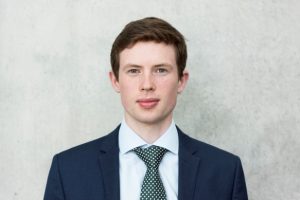
John Scottus Class of 2011. Statistician, Dublin.
After finishing school in 2011, Eóin Flaherty studied Economics and History in UCD and went on to work in the European Central Bank in Frankfurt. Since 2017, he has been a statistician in the Central Statistics Office in Dublin and is also pursuing a part time PhD.
What were your main interests when you were in school?
During the Junior cycle, I was quite interested in Science, Irish and History. I also really liked Art, though I wasn’t very good at it. I also played hockey from the age of six or seven. I got more interested in Economics in Transition year. I was also very interested in current affairs.
What did you study in university and what are your highlights from this time in your life?
I studied Economics and History in UCD. There were so many opportunities to learn things. Towards the end of my BA, I coordinated a student conference about sustainability and global challenges. That was a big highlight of my undergrad. I was also heavily involved in founding the Economics Society. I was also involved in the History Society and the Hockey Club.
What are you doing now?
I work in the Central Statistics Office (CSO) as a statistician. We produce data on everything that is happening in the country. The particular area I work in is about the Irish economy. More recently, I went back to UCD to do a part-time PhD. It’s about effect of foreign multinational firms and migration on workers in Irish firms.
What other jobs have you had?
I was lucky enough to have had a few jobs during university. I worked in a small business during first and second year. I also did an internship in Bank of New York Mellon in Dublin. After my Masters, I worked in the CSO for a year and then I spent over a year working in financial stability in the European Central Bank (ECB). It was a very exciting place to work and I made great friends there.
What memories of JSS have stayed with you?
Well, the school trips have definitely stayed with me. There were quite a lot of them. I remember the trip to Glenveagh, in Donegal during primary school. It’s an intriguing place, beautiful gardens in the middle of a barren landscape. The trip to Florence in Second Year was quite inspiring. It was sunny and beautiful and gave me a better sense of the Renaissance and what people can create when they put their mind to it.
The other thing that stands out is some of the teachers. I remember things like Mr McMullen’s Biology class in the lead up to the Leaving Cert. He was a veteran teacher. He didn’t use the book but drew all the diagrams on the board and labelled them from memory for us to take down. He would also dictate notes to us from memory. I found him very inspiring.
How did you find school life when you were in school?
I liked it. I also got on pretty well with all of my classmates. I’m still in touch with most of them. We’re going to meet up next week and we still sometimes go on holidays together.
What influences from JSS have you carried through with you to today?
Well, a very tangible influence is that I still use a fountain pen. That’s basically because I like writing with a fountain pen. From a sustainability side, I like having a pen that lasts for five years, or until I lose it, and a bottle of pen ink also lasts a long time. There’s something very nice about that. I also have some idea that it makes my slightly bad writing a little bit better.
I do meditate, so that has definitely stuck with me. To me, meditation is the idea of reducing the amounts of thoughts that you have, observing them and letting them pass. It’s very easy to overthink things. But I think if you meditate properly, which is essentially sitting down for fifteen minutes, or half an hour and actively not engaging your mind in current problems, but instead focusing on the mantra for that amount of time, this can improve the way you think about things and make you much calmer.
Are you appreciative of your education in JSS?
Yes, I am. There’s no question that it had an important effect on my development. For example, I’m very appreciative of having studied Ancient Greek. It’s a subject that I didn’t always like, but it was one that I wanted to be good at and I was glad that I did it.
Would you have liked to go to a different school looking back? A more normal school?
No, definitely not actually. I think the variety and uniqueness of the John Scottus education was really special. I remember having organic biscuits and milk and water in primary school. There was also a sense of idealism as well. Mrs Haines certainly had the idea that we should be leaders. She expected a lot of us, she had a high standard and pushed us to get there. But from the start, we had an incredible sense of ‘Why not?’.
